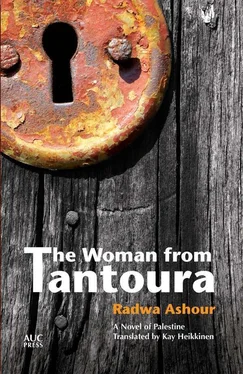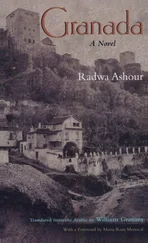I began to laugh.
“Second, there are real reasons to fear that he will take advantage of my absence to occupy my place, even though it’s known, proven, and confirmed by your very own words, that the three boys are one thing and Maryam is something entirely different. I’m alerting you to his evil intentions.”
Abed jumps up and sits on the back of my chair, putting his arms around me.
“I will begin immediately to execute my evil intentions. I believe that Sitt Maryam has occupied the throne long enough, and the time has come to depose her. I’m a democrat! What do you say, shall we smuggle her out like kittens? We’ll get rid of her and live without a nagging censor.”
We didn’t go to sleep until the break of dawn.
When they went to bed I made myself another cup of coffee and waited for daylight, then I left for the market. A boy helped me carry everything I bought to the house. Maryam was sleeping; as for Abed, he had bathed and changed his clothes. We had breakfast together, and then, “By your leave, Mother.”
“Where to?”
“I have work, I’ll see you at lunch.”
Maryam doesn’t know Sidon, she never lived there like her brothers. Maybe she only visited it once or twice, when she was less than five. She says she doesn’t remember it.
I take her to old Sidon, to the Bab al-Serail Square, I say, “It was here ….”
I point to the Bab al-Sarail Mosque, to the Khan, to an old sign on the closed door of an apartment on the ground floor, which says: al-Irfan Printers, Ahmad Arif al-Zain, Proprietor, Founded 1910. “Your grandfather knew Sheikh Ahmad Arif al-Zain personally. He told me about him, and he said ….”
We go down a few steps and walk through a dark archway. This is the Abu Nakhla neighborhood. I point to the Abu Nakhla Mosque on my left and the oven on my right; I say, “When your grandmother made a vow she would inform the Abu Nakhla oven, and they would make as much bread as she asked for and distribute it in the mosque.”
A few steps under the arches that connect the two sides of the lane. “Here is the Sabil neighborhood, and this house on your right is where your grandmother and grandfather lived.”
We keep walking. “This is what’s left of the public bath where your uncle Ezz bathed the day of his wedding. It was destroyed by the Israeli shelling in ’82.”
I take her to the Great Omari Mosque, and say that the men gathered here on the day of … here was the funeral of ….
Then the Maqasid Islamic School next to the great mosque. Maryam tries to convince the guard to let us in, but he says he’s sorry, it’s not allowed; school is in session and the students are studying. Maryam looks through the gate at the school buildings to the right and left of the courtyard. I point to the sea behind the courtyard: “This is where the boats carrying the weapons would anchor at night, and ….”
I take her to the carpenters’ market, to the shoemakers’ market, to the perfumers’ market. I take her to the castle on the sea and to the Khan al-Afranj.
We sit in a café overlooking the sea, divided from it by the highway. I say, “We used to call it ‘the holiday sea’; now it has become ‘the waterfront.’” She doesn’t catch what I mean to say, and I don’t explain.
Maryam said that Hasan was right. “He told me, ‘Old Sidon is a sequence of light and shadow. The lane will be dark because it’s narrow and there are houses and shops on both sides, with arches above and bridges that also might have houses suspended on them, but before you get used to the shadow you’re surprised by a long, sunny open space. Because we were kids we didn’t walk but rather flew, so we would move in the blink of an eye from the light to the dark and from the dark to the light, as if we were playing with the sun and it was playing with us. And not only the lanes but the houses too: you step into a dark place where you nearly trip, because you can’t see where you step, or because the ghoul is lurking there, waiting for you. Then suddenly you’re on stairs flaming with daylight. You jump up the steps and stop a moment to lean over a tin basin planted with mint or jasmine, or you find yourself in front of the sea, lit up as if there were a fire under it.’”
“Hasan wrote me that in his letter. But he didn’t tell me anything about the poverty, the run-down houses, and the tired faces.”
It’s strange; Maryam didn’t buy sweets as visitors usually do, nor the bars of soap for which the city is famous. From the carpenters’ market she bought a small chest and a sieve and a pair of clogs. I said, “As long as you want the clogs for decoration, let’s look for some Syrian ones, inlaid with shell.” Then laughing, “You’ve become like the foreigners, Maryam — you hang the sieve on the wall and put the clogs on the living room table. Souvenirs from life in the old days. I hope you don’t ask me for an embroidered peasant dress so you can hang it on the wall of your apartment in France!”
She said, laughing hard, “‘You wrong me, Sir!’ As for the chest, I’ll put your picture in it, and my father’s picture, and the love letters that will definitely come to me some day! I’ll close the chest and keep it in my dresser.”
“And the sieve?”
“I’ll put it next to my bed so I don’t forget to sift my thoughts and feelings every night before I go to sleep.”
I laughed. “And the clogs?”
“Here we have the main thing. I’ll be sure to use them every day, if only for an hour. I’ll stomp on the ground with them and hear the sound, and it will reassure me that I’m here, here and then some!”
“What an imagination you have, Maryam!”
“Mama, sometimes we keep things without being able to sum up their value in one meaning. Do you remember the marble that the boy in Shatila gave me?”
“What marble, what boy?”
“The one the boy bought from Mustafa Umda’s shop.”
“Who’s Mustafa Umda?”
She reminded me of the story, and then said, “I still have it. Not because I think it will bring luck or it’s an amulet or a charm, but just for some reason. A small glass marble for kids to play with. When I get it out of the place where I keep it, I put it in the palm of my hand and stare at it, and recall moments and places and faces. I see the boy who gave it to me; he was very handsome, astonishing. I was five; can a child of five fall in love? I wonder where he is now, if he left the camp and life took him to a new exile, or if he stayed there, and has been buried under the rubble since the fall of ’82. I look into his marble and see things, I see myself and maybe the past and the future. I close my hand around it carefully and put it away again.”
In the house we sit together, or we stand in the kitchen, sharing in preparing a meal or a cup of coffee to have on the balcony. We talk, endlessly. We laugh. She tells me things and I tell her. We barely see Abed, who leaves the house early and rarely comes back for lunch, though we usually have supper together. He’s preparing to file suit in the Belgian courts. Why Belgium, Abed? He gives a lengthy, involved answer about binding international laws and regulations, the Treaty of Rome and the decisions that followed it, and the European countries that had adopted it. At the end of the detailed talk comes the specific answer: “Because Belgium is the one country in the world that allows individuals to file suits of this kind. They present their complaint to the investigating magistrate, and if the basis of the claim is present then he is required to look into it. This is the first reason; second, because immunity is not considered an impediment in the criminal courts in Belgium. Third, because the Belgian courts accept the principle of trying the accused in absentia, meaning that someone accused of torture or war crimes or crimes against humanity can be tried even if he is not present, or not a Belgian citizen, or not living in the country. Two weeks ago a group of my colleagues filed a suit in the name of twenty-three plaintiffs against Ariel Sharon, Amos Yaron, and other Israelis and Lebanese, for the massacre in Sabra and Shatila. They presented the documents to the investigating magistrate in the Belgian criminal court; now we’re preparing other suits, about the Sidon elementary school and the Jad Building.”
Читать дальше












